WASHINGTON — Filling up your gas tank, buying groceries, trying to plan a vacation: it’s a little harder when things cost so much these days. Meanwhile, the Federal Reserve continues raising its key interest rate, last week seeing the largest hike in nearly 30 years.
Could making some things more expensive really be the answer to inflation?
THE QUESTION:
Can raising interest rates curb inflation?
THE SOURCES:
- The Bureau of Economic Analysis at the Department of Commerce
- The Federal Reserve
- Jeffrey Harris, American University Finance Professor
THE ANSWER:
Yes, raising interest rates is a common tool used to bring inflation under control–but it’s not guaranteed to work.
WHAT WE FOUND:
“Baseball cards, cryptocurrencies, all sorts of assets have gone up in price,” said Jeffrey Harris, American University finance professor.
He says partially because of economic disruption due to the COVID-19 crisis, and partially due to trade issues with the war in Ukraine-–the economy is “overheating.”
“One way to try to tame that inflation is to raise interest rates, the price of borrowing in the economy, to try to cool off the spending that people are making,” said Harris.
The Federal Reserve Bank of Cleveland explains online that when inflation is too high, the Fed typically raises interest rates to slow the economy and bring inflation down. When inflation is too low, the Federal Reserve typically lowers interest rates to stimulate the economy and move inflation higher.
Higher interest means it’s more expensive to take out a loan for things like getting a new car, starting a business, or buying a home.
However, those costs are not the only factor that impact inflation, and a variety of factors contribute to the health of the economy.
“It's a complex interaction of forces that happen. And one of the things we do know is it makes it harder to borrow. So it does have some impact of slowing the economy,” said Harris. “So one of the features that the Federal Reserve tries to assess is whether it's going to slow the economy by too much, or by how much? And that's not always a straightforward answer.
Though it's no guarantee, many economists agree the US is in danger of entering a recession.
Technically, the Bureau of Economic Analysis could call any slippage in economic activity a recession, but the most widely accepted definition is two consecutive quarters of negative GDP growth. The first quarter of 2022 did experience negative growth.
Will changing the interest rate help us avoid a recession—or drive us toward one?
That’s the billion-dollar question.
“I think that's the lesson we learned about economics over the last 100 years is you have to be very careful in assessing the impact of government policy, in particular, it's not always the same,” said Harris. “Even doing the same thing doesn't always result in the same outcome.”

